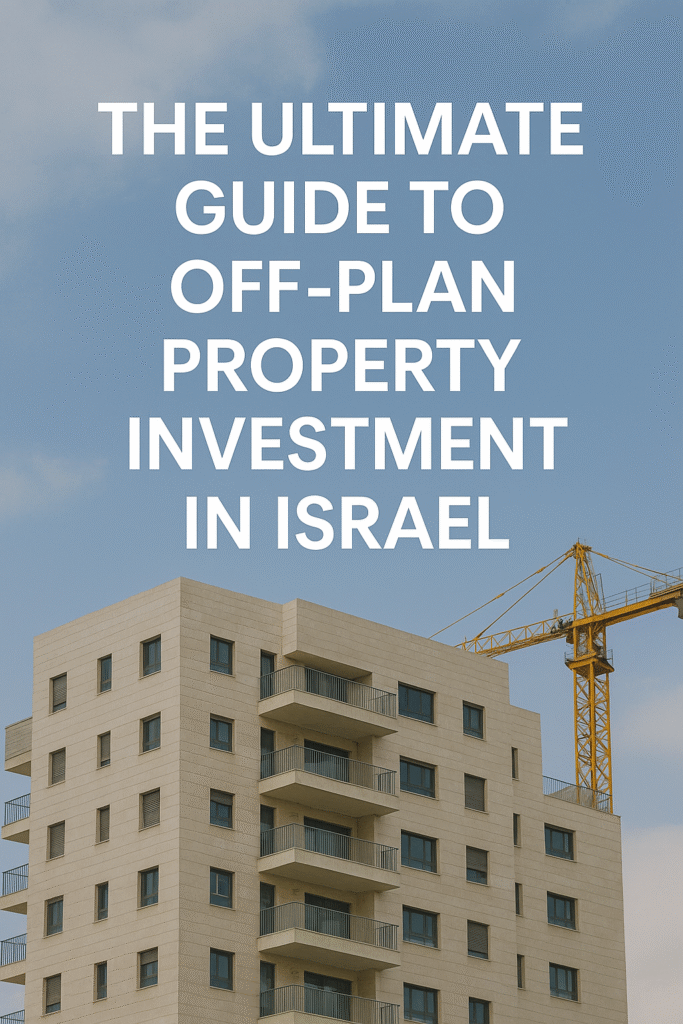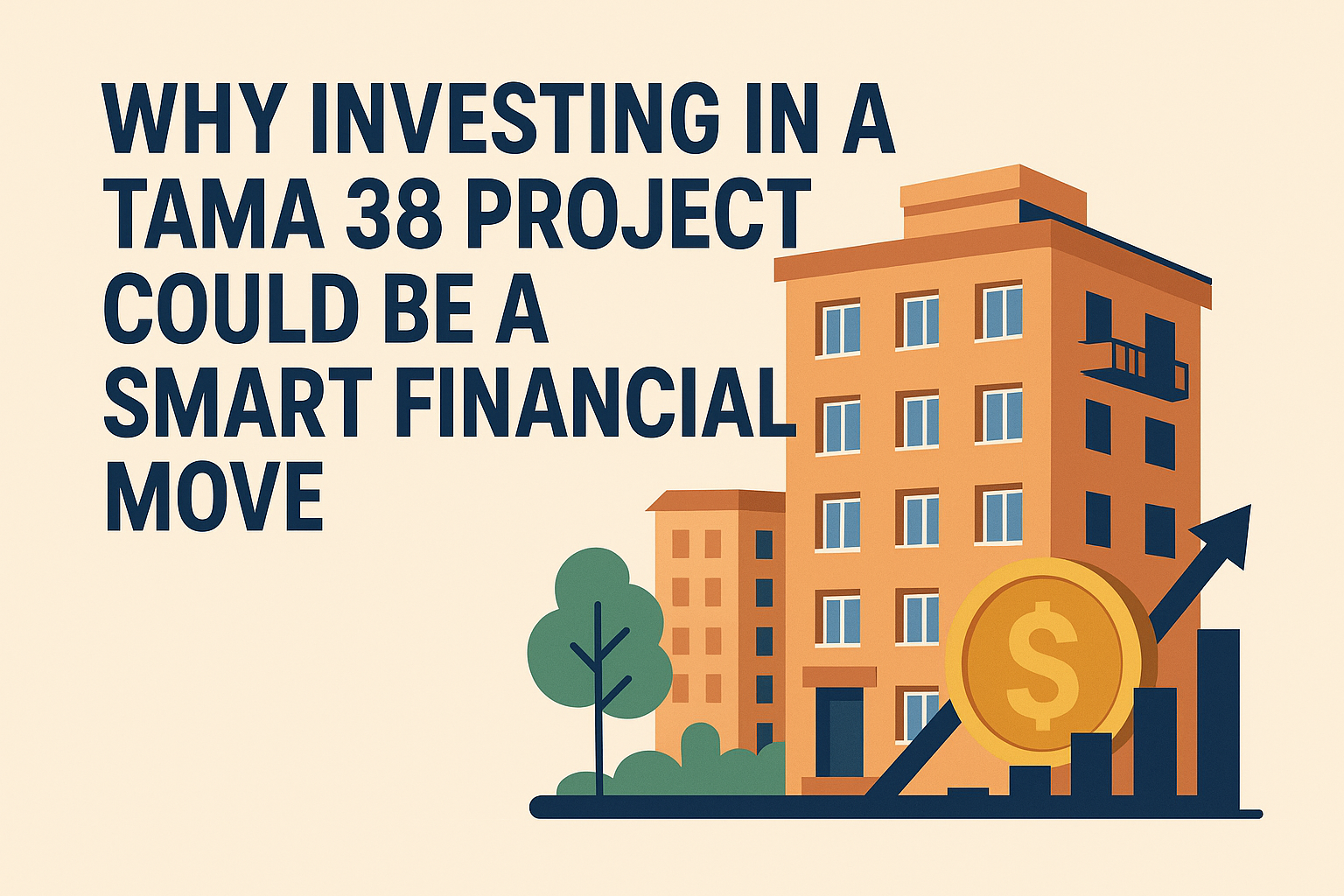Introduction
Investing in off-plan properties—those purchased during the pre-construction phase—has become increasingly popular in Israel’s dynamic real estate market. This investment strategy offers unique advantages, especially in a country where housing demand consistently outpaces supply and property values have demonstrated remarkable resilience over time.
Israel’s property market presents a distinctive opportunity for investors, combining economic stability, technological innovation, and a persistent housing shortage. Whether you’re a foreign investor looking to diversify your portfolio or a local seeking to capitalize on market growth, this comprehensive guide will navigate you through the intricacies of off-plan property investment in Israel.
Table of Contents
- Understanding Israel’s Property Market
- Advantages of Off-Plan Investment
- Key Regions for Investment
- Legal Framework for Foreign Investors
- The Purchasing Process
- Financial Considerations
- Risk Management Strategies
- Market Outlook and Trends
- Case Studies: Successful Off-Plan Investments
- Conclusion
Understanding Israel’s Property Market
Israel’s real estate market has several distinctive characteristics that make it attractive for off-plan investments:
Persistent Housing Shortage
Israel faces a structural housing deficit estimated at over 100,000 units. The combination of a growing population (approximately 2% annually), high birth rates, immigration, and limited land resources creates sustained demand pressure. This fundamental imbalance between supply and demand creates a favorable environment for property investment.
Economic Resilience
Israel’s economy has demonstrated remarkable stability, even during global downturns. Known as the “Start-up Nation,” Israel’s tech-driven economy, highly educated workforce, and innovation ecosystem contribute to economic growth that directly impacts real estate values.
Historical Price Appreciation
Property values in Israel have shown consistent long-term appreciation. Between 2008 and 2023, residential property prices increased by approximately 130% nationwide, outpacing many developed markets. While growth rates fluctuate, the overall trajectory remains positive, particularly in high-demand urban centers.
Government Intervention
The Israeli government actively intervenes in the housing market through various programs aimed at increasing supply and regulating prices. Understanding these policies—including “Mechir Lamishtaken” (Buyer’s Price) and urban renewal initiatives—is crucial for investors navigating this market.
Advantages of Off-Plan Investment
Price Premium
Off-plan properties typically come with a significant discount compared to completed properties, often ranging from 15-30% below market value. This built-in equity creates potential for capital appreciation even before construction is completed.
Payment Flexibility
Most developers offer staged payment plans, allowing investors to spread payments throughout the construction period. A typical structure might include:
- 20-30% upon signing
- 20-25% when foundations are completed
- 20-25% when construction reaches midpoint
- Remaining balance upon completion
This structure improves cash flow management and allows investors to leverage their capital more efficiently.
Customization Options
Buying during pre-construction phases often allows for customization options, from layout modifications to finish selections. This flexibility enables investors to tailor properties to target rental demographics or maximize resale value.
New Building Standards
Recent properties adhere to Israel’s increasingly stringent building codes, including enhanced earthquake resistance (Teken 413), energy efficiency standards, and modern amenities. These features contribute to long-term value retention and rental attractiveness.
Key Regions for Investment
Tel Aviv Metropolitan Area
Israel’s financial and cultural hub continues to lead in property values and rental yields. Areas experiencing significant development include:
- Ramat Gan: Adjacent to Tel Aviv with comparatively lower prices but similar accessibility
- Herzliya Pituach: Premium coastal location with luxury developments
- Bat Yam: Undergoing urban renewal with beachfront developments at more accessible price points
Jerusalem
The capital offers unique investment opportunities, particularly in:
- West Jerusalem: Traditionally stable neighborhoods like Rehavia and German Colony
- Emerging areas: Neighborhoods benefiting from the light rail expansion, such as Kiryat Hayovel and Bayit VeGan
Haifa and the North
With improved transportation infrastructure and technology sector growth:
- Haifa Lower City: Urban renewal projects transforming former industrial areas
- Krayot suburbs: Affordable investment options with improving infrastructure
Beer Sheva and the South
The expanding cyber technology hub and Ben-Gurion University create investment opportunities:
- Beer Sheva North: New residential developments near the high-tech park
- Satellite communities: Growing towns like Ofakim and Netivot benefit from improved rail connections
Legal Framework for Foreign Investors
Ownership Structures
Foreign investors can purchase property in Israel with few restrictions, but must navigate certain considerations:
- Individual Ownership: Straightforward but subject to acquisition tax rates that can be higher for non-residents
- Company Ownership: Israeli or foreign companies can purchase property, potentially offering tax advantages but requiring ongoing compliance
- Trust Structures: Increasingly popular, allowing for succession planning and potentially favorable tax treatment
Land Classification
Israel’s land ownership system has unique characteristics:
- Privately Owned Land: Accounts for only about 7% of Israel’s land
- Israel Land Authority (ILA) Leased Land: Most residential properties are built on 49-98 year renewable leases from the ILA
- Special Zones: Some areas have additional restrictions or considerations for foreign purchasers
Tax Considerations
Foreign investors should be aware of several taxes:
- Purchase Tax (Mas Rechisha): Progressive tax starting at 8% for non-residents up to 10% for higher-value properties
- Capital Gains Tax: Non-residents are subject to a 25% tax on real appreciation value
- Rental Income Tax: Subject to regular income tax rates or a simplified track at 10% of gross rental income
- Value Added Tax (VAT): Generally 17% but applicable mainly to new properties and typically included in the purchase price
The Purchasing Process
Developer Due Diligence
Before committing to an off-plan purchase, thorough investigation of the developer is essential:
- Track Record: Previous project completions, quality, and timeliness
- Financial Stability: Company balance sheet and project financing
- Reputation: Customer satisfaction and after-sale service
- Construction Insurance: Verification of “Hok HaMecher” insurance coverage
Legal Verification
Comprehensive legal checks should include:
- Land Registration: Confirming the developer’s rights to the land via Tabu (Land Registry) extracts
- Building Permits: Verification that all necessary approvals are in place
- Contract Review: Thorough examination of the sale agreement by an attorney specialized in Israeli real estate
- Bank Guarantee: Ensuring that payments are secured by appropriate bank guarantees as required by law
Project Evaluation
Critical assessment factors include:
- Location Fundamentals: Proximity to transportation, schools, commercial centers
- Project Specifications: Quality of materials, technical specifications, communal facilities
- Pricing Comparison: Benchmark against similar projects in the area
- Development Timeline: Realistic assessment of completion dates and potential delays
Reservation and Contract
The typical process involves:
- Reservation Agreement: Initial document securing the specific unit with a modest deposit
- Sale Agreement: Comprehensive contract detailing all aspects of the purchase
- Technical Specification (Mifrat Techni): Detailed description of materials and finishes
- Payment Schedule: Clearly defined installment plan aligned with construction milestones
Financial Considerations
Financing Options
For off-plan purchases, consider:
- Domestic Mortgages: Available to foreign investors but typically limited to 50% LTV versus 75% for residents
- International Financing: Some investors leverage home-country financing sources
- Developer Financing: Occasionally available, especially for foreign investors
- Guarantees: “Hok HaMecher” (Sale Law) guarantees protect buyer payments during construction
Investment Calculations
Key metrics for evaluating potential returns:
- Entry Price vs. Market Value: Compare pre-construction pricing with completed property values in the area
- Projected Rental Yield: Typically ranges from 2.5-4% in central locations to 4-6% in peripheral areas
- Capital Appreciation Potential: Historical growth rates in the specific neighborhood
- Total Return Calculation: Combined rental income and capital appreciation minus expenses and taxes
Expense Planning
Comprehensive expense budgeting should include:
- Purchase Costs: Lawyer fees (1-2%), purchase tax (variable), registration fees
- Ongoing Costs: Property management (if applicable), maintenance fees (Vaad Bayit), municipal taxes (Arnona)
- Exit Costs: Capital gains tax, agency fees (typically 2% + VAT)
Risk Management Strategies
Legal Protections
Mitigate risks through:
- Bank Guarantees: Ensure all payments are secured under the Sale Law (Hok HaMecher)
- Milestone-Based Payments: Link payments to verifiable construction progress
- Contractual Safeguards: Include clear remedies for delays and specification changes
- Title Insurance: Consider additional protection, especially for complex transactions
Construction Monitoring
Active oversight during construction:
- Progress Inspections: Regular site visits or hiring of a professional inspector
- Documentation: Maintain records of all communications regarding changes or issues
- Technical Consultations: Engage an engineer for key inspection phases
- Snag List: Comprehensive defect identification before accepting delivery
Market Risk Mitigation
Strategies to address market fluctuations:
- Phased Investments: Spread capital across multiple smaller projects rather than one large investment
- Location Diversification: Invest across different cities or neighborhoods
- Segment Diversification: Consider different property types (residential, commercial)
- Exit Strategy Flexibility: Plan for both rental and resale scenarios
Market Outlook and Trends
Current Market Dynamics
As of 2023-2024, several factors are shaping Israel’s property market:
- Interest Rate Environment: Rising rates have moderated price growth but underlying demand remains strong
- Construction Costs: Increased materials and labor costs are being passed on to new development pricing
- Urban Renewal Acceleration: Pinui-Binui (evacuate and build) and TAMA 38 projects are transforming urban centers
- Transportation Infrastructure: Major transport projects like Tel Aviv’s light rail are creating investment opportunities in newly accessible areas
Emerging Trends
Forward-looking investors should monitor:
- Smart Home Integration: Growing premium for tech-enabled living spaces
- Sustainable Building: Increased focus on energy efficiency and green building standards
- Micro-Apartments: Rising acceptance of smaller, efficiently designed urban units
- Co-Living Developments: New formats catering to young professionals and digital nomads
- Mixed-Use Projects: Integration of residential, commercial, and workspace environments
Regional Development
Government initiatives driving regional opportunities:
- Northern Development: Programs to attract population and businesses to the Galilee region
- Southern Expansion: Beer Sheva’s emergence as a cyber technology center
- Metropolitan Planning: Enhanced regional planning creating new commuter-friendly locations
Case Studies: Successful Off-Plan Investments
Case Study 1: Tel Aviv Metropolitan Area
Project: Park TLV, Ramat Gan Investment Timeline:
- Purchase: 2019 pre-construction at ₪2.1M for 3-room apartment
- Completion: 2022
- Current Market Value: ₪2.8M (33% increase) Key Success Factors:
- Proximity to new light rail station
- Developer reputation for quality finishes
- Strategic timing before major price escalation
Case Study 2: Jerusalem Outskirts
Project: Green Valley, Mevaseret Zion Investment Timeline:
- Purchase: 2018 pre-construction at ₪1.6M for 4-room apartment
- Completion: 2021
- Current Market Value: ₪2.2M (37.5% increase) Key Success Factors:
- Improved highway access to Jerusalem
- Community amenities including parks and retail
- Limited new supply in this suburban location
Case Study 3: Northern Growth Area
Project: Haifa Bay View, Haifa Investment Timeline:
- Purchase: 2020 pre-construction at ₪1.3M for 4-room apartment
- Completion: 2023
- Current Market Value: ₪1.7M (30.7% increase) Key Success Factors:
- Part of lower city revitalization
- Sea views and premium specifications
- Government infrastructure investment in the area
Conclusion
Off-plan property investment in Israel offers compelling opportunities for investors seeking both capital appreciation and income generation. The market’s fundamental supply-demand imbalance, combined with economic resilience and strategic government development initiatives, creates a favorable long-term investment environment.
However, success requires careful due diligence, local market knowledge, and proper risk management. Foreign investors in particular should ensure they have proper legal representation and understand the tax implications of their investments.
By leveraging the price advantages of pre-construction purchasing while carefully selecting locations with strong growth fundamentals, investors can build valuable real estate portfolios in one of the world’s most resilient property markets.
Disclaimer
This guide is intended for informational purposes only and does not constitute investment, legal, or tax advice. Property investment carries risks, and investors should conduct their own research and consult with qualified professionals before making investment decisions.

